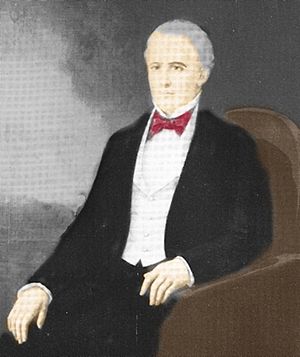Domingo Matheu facts for kids
Quick facts for kids
Domingo Matheu
|
|
|---|---|

Portrait of Domingo Matheu
|
|
| 2nd President of the Junta Grande in the United Provinces of the Río de la Plata | |
| In office August 26, 1811 – September 23, 1811 |
|
| Preceded by | Cornelio Saavedra |
| Succeeded by | First Triumvirate |
| Committee member of the Primera Junta and Junta Grande | |
| In office May 25, 1810 – September 23, 1811 |
|
| Personal details | |
| Born |
Domingo Bartolomé Francisco Matheu
August 4, 1765 Mataró, Spain |
| Died | March 28, 1831 (aged 65) Buenos Aires, United Provinces of the Río de la Plata |
| Resting place | La Recoleta Cemetery |
| Nationality | Argentine |
| Political party | Patriot |
| Signature |  |
| Military service | |
| Allegiance | Viceroyalty of the Río de la Plata |
| Rank | Lieutenant colonel |
| Battles/wars | British invasions of the Río de la Plata |
Domingo Bartolomé Francisco Matheu (born August 4, 1765, in Mataró, Spain – died March 28, 1831, in Buenos Aires, Argentina) was an important businessman and politician. He was born in Spain but became an Argentine citizen.
Matheu was a key member of the Primera Junta, which was the very first national government of what is now Argentina. He also served as the second president of the Junta Grande for a short time in 1811.
Contents
About Domingo Matheu
Early Life and Moving to Argentina
Domingo Bartolomé Francisco Matheu was born on August 4, 1765. His parents were Juan Pablo José Benito Matheu Ros and Antonia Chicola. He went to the "Pías" school in Mataró, where he studied math and naval topics.
He became a skilled ship pilot. This job allowed him to travel to many Spanish territories, like La Habana (Cuba), the Philippines, and the Canary Islands. In 1791, he moved to Buenos Aires. He didn't agree with the strict trade rules at the time. He worked to gain support from local people, both for business and political reasons.
Fighting for Buenos Aires
Matheu joined a military group called the Regiment of Miñones. This was during the British invasions of the Río de la Plata. He became a lieutenant in the second company, working under Juan Larrea.
After Buenos Aires was freed from British control in 1806, Matheu and others wanted to create a new military unit. They called it "Urbanos Voluntarios de Cataluña." The leader of the colony, Viceroy Santiago de Liniers, approved this new group.
When Larrea became ill, Matheu led this unit during the second British attack in 1807. He fought in the city, using buildings for cover in what is called urban warfare. Because of his brave actions in defending Buenos Aires, he received a special award in 1809.
The May Revolution and New Government
Events in Spain, like the capture of King Ferdinand VII and the fall of the Spanish government, caused big political disagreements in Buenos Aires. This led to the May Revolution. Many local leaders, called criollos, believed that the current Viceroy, Baltasar Hidalgo de Cisneros, no longer had the right to rule.
They asked for an open cabildo, which was a special meeting where important people could discuss the situation. Matheu attended this meeting. The people decided to create a new government, called a Junta, with representatives from all parts of the country.
The Viceroy tried to stay in power as the head of this new Junta, but the criollos did not agree. Matheu was chosen to be a member of the first government, the Primera Junta. The reasons why each person was chosen are not fully clear. One idea is that it was a way to balance different groups and ideas in the new government.
Building Weapons for Independence
The May Revolution started the Argentine War of Independence. A big problem was that the country did not have enough weapons. Since there wasn't much money to buy them, the Primera Junta decided to build its own armories (places where weapons are made).
Domingo Matheu was put in charge of the main armory in Buenos Aires. He worked with skilled German gunsmiths like Juan Frye and Fernando Lamping. Under his direction, they made many muskets (a type of rifle) and some artillery pieces (cannons).
The Buenos Aires armory was located where the modern Palace of Justice stands today. It had about 90 workers. Even with limited technical skills, they built and fixed hundreds of muskets and carbines (another type of rifle). Matheu even used his own money to help support the armory. He also helped supervise the armory in the Tucumán Province. Later, he oversaw the making of military uniforms.
Political Roles and Retirement
After the May Revolution, Matheu became a member (called a vocal) of the Primera Junta. This government later grew into the Junta Grande. When Cornelio Saavedra, the president of the Junta Grande, left to join battles in the north, Matheu became its president.
Matheu and Juan Larrea, another important figure, used money from their businesses to help support the new national government. In 1817, Matheu decided to leave politics. He continued to work in business until he passed away in 1831.
Legacy
Domingo Matheu is remembered for leading Argentina's first armory. General Manuel Nicolás Savio later organized the building of a large arsenal (a place for storing and making weapons) in Rosario, Santa Fe. This arsenal was named after Matheu. Its construction began on October 3, 1942, and it was used for many decades.
See also
 In Spanish: Domingo Matheu para niños
In Spanish: Domingo Matheu para niños
 | Claudette Colvin |
 | Myrlie Evers-Williams |
 | Alberta Odell Jones |

